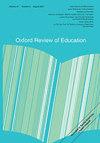Can a code-based approach to marking and feedback reduce teachers’ workload? An evaluation of the FLASH marking intervention
IF 2.1
3区 教育学
Q1 EDUCATION & EDUCATIONAL RESEARCH
引用次数: 0
Abstract
Teacher workload is an important policy concern in many education systems around the world, often considered a contributory factor in teacher attrition. One aspect of workload that could be addressed is reducing the amount of written marking and feedback that teachers do. This article reports on the results of an evaluation of FLASH Marking, an intervention aimed at reducing teachers’ marking workload. FLASH Marking is a code-based feedback approach involving peer- and self-assessment, reducing the need to use alphanumeric grading while promoting the use of students’ metacognitive skills. The study involved a single cohort of 18,500 Key Stage 4 pupils (aged 14/15 at the start of the trial) and their English teachers (n = 990) in 103 secondary schools in England. The impact of the intervention was estimated as the difference in before and after measures of teacher workload, comparing teachers in 52 intervention schools and those in 51 control schools. The results suggest that the intervention had the effect of lessening teachers’ workload by reducing their working hours (effect size 0.16), including hours spent on marking and feedback (0.17). The intervention was largely implemented as designed and teachers were generally positive about the potential impact of FLASH on pupils’ learning outcomes.基于代码的评分和反馈方法能减少教师的工作量吗?对FLASH标记干预的评估
教师工作量是世界各地许多教育系统的一个重要政策问题,通常被认为是教师流失的一个促成因素。可以解决的工作量的一个方面是减少教师的书面评分和反馈的数量。本文报告了FLASH阅卷的评估结果,这是一种旨在减少教师阅卷工作量的干预措施。FLASH Marking是一种基于代码的反馈方法,涉及同伴和自我评估,减少了使用字母数字评分的需要,同时促进了学生元认知技能的使用。这项研究涉及英国103所中学的18500名关键阶段四年级学生(试验开始时年龄为14/15岁)和他们的英语老师(n = 990)。干预的影响是通过比较52所干预学校和51所对照学校的教师在教师工作量测量前后的差异来估计的。结果表明,干预通过减少教师的工作时间(效应值为0.16)来减轻教师的工作量,其中包括用于评分和反馈的时间(效应值为0.17)。干预措施在很大程度上按照设计实施,教师们普遍对FLASH对学生学习成果的潜在影响持积极态度。
本文章由计算机程序翻译,如有差异,请以英文原文为准。
求助全文
约1分钟内获得全文
求助全文
来源期刊

Oxford Review of Education
EDUCATION & EDUCATIONAL RESEARCH-
CiteScore
5.20
自引率
0.00%
发文量
39
期刊介绍:
The Oxford Review of Education is a well established journal with an extensive international readership. It is committed to deploying the resources of a wide range of academic disciplines in the service of educational scholarship, and the Editors welcome articles reporting significant new research as well as contributions of a more analytic or reflective nature. The membership of the editorial board reflects these emphases, which have remained characteristic of the Review since its foundation. The Review seeks to preserve the highest standards of professional scholarship in education, while also seeking to publish articles which will be of interest and utility to a wider public, including policy makers.
 求助内容:
求助内容: 应助结果提醒方式:
应助结果提醒方式:


